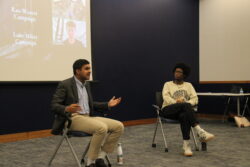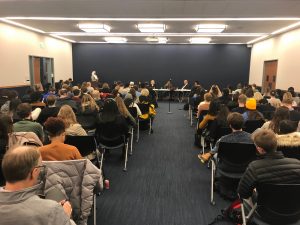On April 25, GUSA hosted a town hall meeting in the Great Room of the Healy Family Student Center to discuss Georgetown’s new “Engaging Differences” core requirement, which will mandate students to take two classes that focus on the diversity of human culture and experience. Students, faculty, and staff all participated in a presentation and discussion which covered the history of the requirement, as well as its potential impact on Georgetown’s academics and campus culture. The requirement was in part a result of student activism last spring. The requirement will be implemented as the class of 2020 arrives on the Hilltop next fall.
Randy Bass, Georgetown’s Vice Provost for Education, opened the event with remarks on the significance of the requirement. Bass noted the record of failed attempts to create a diversity requirement at Georgetown, with the first attempt taking place in 1991. Bass attributed the success of the most recent attempt to exceptional student organization, the ongoing conversation about Georgetown’s past, and the creation of a new core curriculum committee. Bass emphasized the important focus on function during the requirement development process. “We actually defined what we thought such a requirement should try to do, and what it is that should happen in courses that seek to do this,” he said. Bass also emphasized that the current requirement is a “blueprint,” and that student and faculty engagement will be an important part of diversity at Georgetown in the future.
Rosemary Kilkenny, Georgetown’s Vice President for Institutional Diversity and Equity, elaborated on these themes. “We deliberately chose not to impose any hierarchy on the components of the various sources of identity and diversity [that would be covered by the requirement]” she said. When the scope of the requirement was discussed, no group’s experience was prioritized as more deserving of study than any others’. Kilkenny drew parallels between the requirement and Georgetown’s overarching institutional mission. “The [Provost’s Office’s Diversity] working group argued that diversity, social justice, and multiculturalism should be the linchpin of any revised Georgetown curriculum,” said Kilkenny, “The diversity requirement could serve as a tangible manifestation of our Jesuit identity that promotes social justice.”
Dan Zager (COL ‘18), a member of the Last Campaign for Academic Reform, a student group created to draft and pass the requirement last spring, offered a student perspective on the new curriculum. “This activism, it extends from a place of hurt,” said Zager, “I’m in my fourteenth year of Western education, and in so many ways my narrative hasn’t been told and the narratives of others haven’t been told.” Zager was optimistic about the potential of the diversity requirement to validate marginalized and traditionally underrepresented narratives in an academic setting, and bring greater exposure to them within the student body. Zager called the new curriculum “a step in the right direction.”
Michelle Ohnona, the diversity requirement coordinator, then spoke on the design of the requirement. “In terms of designing the Engaging Diversity requirement we looked at several models at peer institutions who have long-standing curricular requirements,” said Ohnona. However, she added that considering Georgetown’s already extensive core curriculum, it would be difficult to add two stand-alone core requirements and still keep students graduating on time. Georgetown will instead implement a “two course overlay requirement.” Classes taken to fulfill one already standing requirements may also fulfill the diversity requirement. Ohnona also emphasized that the classes of 2019 and earlier will be able to search for and take courses that satisfy the requirement, though taking such courses will not be mandatory.
Students and faculty were then split into small groups to discuss diversity and its place in Georgetown’s academic environment. Garet Williams (COL ’18) while speaking for his group noted that the requirement should be valuable for all students at Georgetown, regardless of their identities and backgrounds. “The diversity requirement isn’t just for some group that isn’t addressing diversity. It’s really for everyone,” Williams said, “There’s not a person in any community that knows everything about every community.”
Students and faculty then had the opportunity to pose questions to a panel consisting of Kilkenny, Ohnona, and Professor Ricardo Ortiz of the English department. An audience member asked the panel if professors have shown resentment over the institution of a new core requirement. “There are a very small minority of faculty for whom these issues don’t feel pressing,” Ohnona answered. Ortiz elaborated on the implementation process itself and its reception by faculty. “It wasn’t so much that we had to force faculty to sort of change their courses to make them eligible,” said Ortiz, “It was more like we had to sort of convince them: ‘Your course counts! Your course already counts–you should put it on the docket.’”





